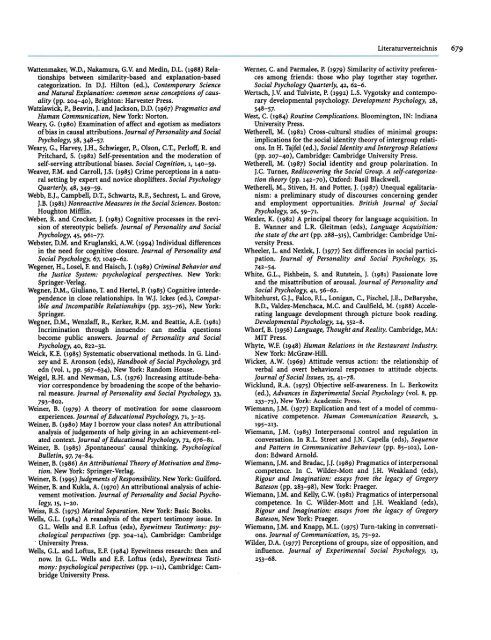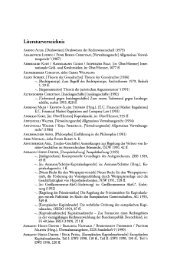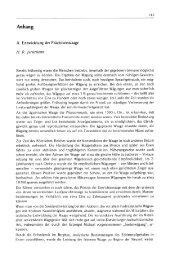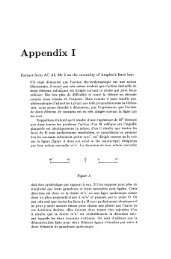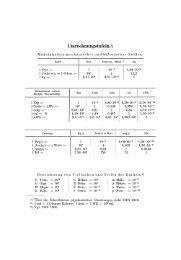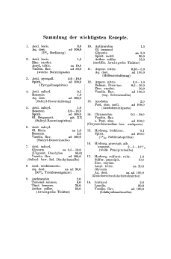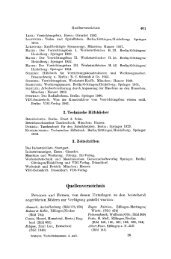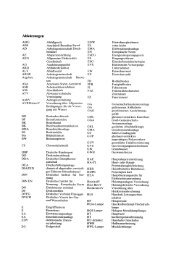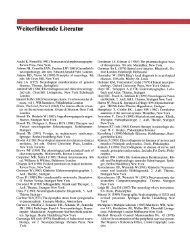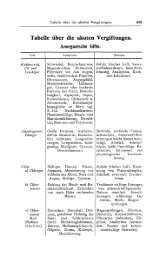Literaturverzeiehnis 679Wattenmaker, W.D., Nakamura, G.V. and Medin, D.L. (1988) Relationshipsbetween similarity-based and explanation-basedcategorization. In D.J. Hilton (ed.), Contemporary Scienceand Natural Explanation: common sense conceptions of causality(pp. 204-40), Brighton: Harvester Press.Watzlawick, P., Beavin, J. and Jackson, D.D. (1967) Pragmatics andHuman Communication, New York: Norton.Weary, G. (1980) Examination of affect and egotism as mediatorsof bias in causal attributions. Journal of Personality and SocialPsychology, 38, 348-57.Weary, G., Harvey, J.H., Schwieger, P., Olson, C.T., Perloff, R. andPritchard, S. (1982) Self-presentation and the moderation ofself-serving attributional biases. Social Cognition, 1, 140-59.Weaver, F.M. and Carroll, J.S. (1985) Crime perceptions in a naturalsetting by expert and novice shoplifters. Social PsychologyQuarterly, 48, 349-59.Webb, E.J., Campbell, D. T., Schwartz, R.F., Sechrest, L. and Grove,J.B. (1981) Nonreactive Measures in the Social Sciences. Boston:Houghton Mifflin.Weber, R. and Crocker, J. (1983) Cognitive processes in the revisionof stereotypie beliefs. Journal of Personality and SocialPsychology, 45, 961-77-Webster, D.M. and Kruglanski, A.W. (1994) Individual differencesin the need for cognitive elosure. Journal of Personality andSocial Psychology, 67, 1049-62.Wegener, H., LoseI, F. and Haisch, J. (1989) Criminal Behavior andthe Justice System: psychological perspectives. New York:<strong>Springer</strong>-Verlag.Wegner, D.M., Giuliano, T. and Hertel, P. (1985) Cognitive interdependencein elose relationships. In W.J. Ickes (ed.), Compatibleand Incompatible Relationships (pp. 253-76), New York:<strong>Springer</strong>.Wegner, D.M., Wenzlaff, R., Kerker, R.M. and Beattie, A.E. (1981)Incrimination through innuendo: can media questionsbecome public answers. Journal of Personality and SocialPsychology, 40, 822-32.Weick, K.E. (1985) Systematie observational methods. In G. Lindzeyand E. Aronson (eds), Handbook of Social Psychology, 3rdedn (vol. 1, pp. 567-634), New York: Random House.Weigel, R.H. and Newman, L.S. (1976) Increasing attitude-behaviorcorrespondence by broadening the scope of the behavioralmeasure. Journal of Personality and Social Psychology, 33,793-802.Weiner, B. (1979) A theory of motivation for some elassroomexperiences. Journal of Educational Psychology, 71, 3-25.Weiner, B. (1980) May I borrow your elass notes? An attributionalanalysis of judgements of help giving in an achievement-relatedcontext. Journal of Educational Psychology, 72, 676-81.Weiner, B. (1985) ,Spontaneous' causal thinking. PsychologicalBulletin, 97, 74-84·Weiner, B. (1986) An Attributional Theory of Motivation and Emotion.New York: <strong>Springer</strong>-Verlag.Weiner, B. (1995) Judgments ofResponsibility. New York: Guilford.Weiner, B. and Kukla, A. (1970) An attributional analysis of achievementmotivation. Journal of Personality and Social Psychology,15, 1-20.Weiss, R.S. (1975) Marital Separation. New York: Basic Books.Wells, G.L. (1984) Areanalysis of the expert testimony issue. InG.L. Wells and E.F. Loftus (eds), Eyewitness Testimony: psychologicalperspectives (pp. 304-14), Cambridge: Cambridge. University Press.Wells, G.L. and Loftus, E.F. (1984) Eyewitness research: then andnow. In G.L. Wells and E.F. Loftus (eds), Eyewitness Testimony:psychological perspectives (pp. 1-11), Cambridge: CambridgeUniversity Press.Werner, C. and Parmalee, P. (1979) Similarity of activity preferencesamong friends: those who play together stay together.Social Psychology Quarterly, 42, 62-6.Wertsch, J.v. and Tulviste, P. (1992) L.S. Vygotsky and contemporarydevelopmental psychology. Development Psychology, 28,548-57·West, C. (1984) Routine Complications. Bloomington, IN: IndianaUniversity Press.Wetherell, M. (1982) Cross-cultural studies of minimal groups:implications for the sodal identity theory of intergroup relations.In H. Tajfel (ed.), Social Identity and Intergroup Relations(pp. 207-40), Cambridge: Cambridge University Press.Wetherell, M. (1987) Sodal identity and group polarization. InJ.C. Turner, Rediscovering the Social Group. A selJ-categorizationtheory (pp. 142-70), Oxford: Basil Blackwell.Wetherell, M., Stiven, H. and Potter, J. (1987) Unequal egalitarianism:a preliminary study of disco urs es concerning gen derand employment opportunities. British Journal of SocialPsychology, 26, 59-71.Wexler, K. (1982) A prindpal theory for language acquisition. InE. Wanner and L.R. Gleitman (eds), Language Acquisition:the state of the art (pp. 288-315), Cambridge: Cambridge UniversityPress.Wheeler, L. and Nezlek, J. (1977) Sex differences in sodal participation.Journal of Personality and Social Psychology, 35,742-54.White, G.L., Fishbein, S. and Rutstein, J. (1981) Passionate loveand the misattribution of arousal. Journal of Personality andSocial Psychology, 41, 56-62.Whitehurst, G.J., Fako, F.L., Lonigan, C., FischeI, J.E., DeBaryshe,B.D., Valdez-Menchaca, M.C. and Caulfield, M. (1988) Acceleratinglanguage development through pieture book reading.Developmental Psychology, 24, 552-8.Whorf, B. (1956) Language, Thought and Reality. Cambridge, MA:MIT Press.Whyte, W.F. (1948) Human Relations in the Restaurant Industry.New York: McGraw-Hill.Wicker, A.W. (1969) Attitude versus action: the relationship ofverbal and overt behavioral responses to attitude objects.Journal of Social Issues, 25, 41-78.Wicklund, R.A. (1975) Objective self-awareness. In L. Berkowitz(ed.), Advances in Experimental Social Psychology (vol. 8, pp.233-75), New York: Academie Press.Wiemann, J.M. (1977) Explication and test of a model of communieativecompetence. Human Communication Research, 3,195-213.Wiemann, J.M. (1985) Interpersonal control and regulation inconversation. In R.L. Street and J.N. Capella (eds), Sequenceand Pattern in Communicative Behaviour (pp. 85-102), London:Edward Arnold.Wiemann, J.M. and Bradac, J.J. (1989) Pragmaties ofinterpersonalcompetence. In C. Wilder-Mott and J.H. Weakland (eds),Rigour and Imagination: essays from the legacy of GregoryBateson (pp. 283-98), New York: Praeger.Wiemann, J.M. and Kelly, C.W. (1981) Pragmatics ofinterpersonalcompetence. In C. Wilder-Mott and J.H. Weakland (eds),Rigour and Imagination: essays from the legacy of GregoryBateson, New York: Praeger.Wiemann, J.M. and Knapp, M.L. (1975) Turn-taking in conversations.Journal of Communication, 25, 75-92.Wilder, D.A. (1977) Perceptions of groups, size of opposition, andinfluence. Journal of Experimental Social Psychology, 13,253-68.
680 LiteraturverzeichnisWilder, D.A. (1984) Intergroup contact: the typical member andthe exception to the rule . . journal of Experimental SocialPsychology, 20, 177-94.Wiley, N. (1994) The Semiotic Self. Cambridge: Polity Press.Wilke, H.A.M. and Meertens, R.W. (1994) Group Performance.London: Routledge.Wilkinson, S. (ed.) (1986) Feminist Social Psychology: developingtheory and practice. Milton Keynes: Open University Press.Williams, J.A. and Watson, G. (1988) Sexual inequality, family lifeand family therapy. In E. Street and W. Dryden (eds), FamilyTherapy in Britain (pp. 291-311), London: Harper & Row.Williamson, T.M. (in press) Investigation and interviewing: thechanging criminal justice context. In F. Leishman, B. Lovedayand S. Savage (eds), Case Issues in Policing, London: LongmanHigher Education.Wills, T.A. (1982) Nonspecific factors in helping relationships. InT.A. Wills (ed.), Basic Processes in Helping Relationships (pp.381-404), New York: Academie Press.Wills, T.A. (1991) Sodal support and interpersonal relationships.In M.S. Clark (ed.), Prosocial Behavior (pp. 265-89), NewburyPark, CA: Sage.Wills, T.A. (1992) The helping process in the context of personalrelationships. In S. Spacapan and S. Oskamp (eds), Helpingand Being Helped. Naturalistic studies (pp. 17-48), NewburyPark, CA: Sage.Wilson, D.W. and Schafer, R.B. (1978) Is sodal psychologyinterdisciplinary? Personality and Social Psychology Bulletin,4,548-52.Wilson, E.O. (1975) Sociobiology: the new synthesis. Cambridge,MA: Harvard University Press.Wilson, M. and Daly, M. (1992) The man who mistook his wife fora chatte!. In J.H. Barkow, L. Cosmides and J. Tooby (eds), TheAdapted Mind. Evolutionary psychology and the generation ofculture (pp. 289-321), New York: Oxford University Press.Wilson, T.D and Dunn, D.S. (1986) Effects of introspection onattitude-behavior consistency: analyzing reasons versus focusingon feelings. journal of Experimental Social Psychology, 22,249-63·Wilson, T.D, Dunn, D.S., Kraft, D. and Lisle, D.J. (1989) Introspection,attitude change, and attitude-behavior consistency: thedisruptive effects of explaining why we feel the way we do.In L. Berkowitz (ed.), Advances in Experimental Social Psychology(vol. 22, pp. 287-343), San Diego, CA: Academie Press.Wilson, T.D., Laser, P.S. and Stone, J.1. (1982) Judging the predietorsof one's own mood: accuracy and the use of sharedtheories. journal of Experimental Social Psychology, 18,537-56.Winnykamen, F. (1990) Apprendre en imitant? Paris: Presses Universitairesde France.Winter, L., Uleman, J.S. and Cunniff, C. (1985) How automatie aresocial judgments? journal of Personality and Social Psychology,49, 904-17·Wishner, J. (1960) Reanalysis of ,impressions of personality'.Psychological Review, 67, 96-112.Witt, L.A. (1989) Authoritarianism, knowledge of AIDS, andaffect towards persons with AIDS: implications for health education.journal of Applied Psychology, 19, 599-607.Wood, W. (1982) Retrieval of attitude-relevant information frommemory: effects on susceptibility to persuasion and on intrinsicmotivation. journal of Personality and Social Psychology,42, 798-810.Wood, W., Lundgren, S., Ouellette, J.A., Busceme, S. and Blackstone,T. (1994) Minority influence: a meta-analytic reviewof sodal influence processes. Psychological Bulletin, 115,323-45.Wood, W., Wong, F.Y. and Cachere, J.G. (1991) Effects of mediaviolence on viewers' aggression in unconstrained social situations:effects of an aggressive model on the behavior of collegestudent and prisoner observers. Psychonomic Science, 24,193-4·Woodward, W.R. (1980) Toward a critical history of psychology.In J. Brozek and L. Ponfraz (eds), Historiography of ModernPsychology (pp. 29-67), Toronto: Hogrefe.Worchel, S., Andreoli, V.A. and Folger, R. (1977) Intergroupcooperation and intergroup attraction: the effect of previousinteraction and outcome of combined effort. journal of ExperimentalSocial Psychology, 13, 131-40.Word, C.O., Zanna, M.P. and Cooper, J. (1974) The nonverbalmediation of self-fulfilling prophedes in interracial interaction.journal of Experimental Social Psychology, 10, 109-20.Wortman, C.B. and Conway, T.L. (1985) The role of sodal supportin adaptation and recovery from physieal illness. In S. Cohenand S.L. Syme (eds), Social Support and Health (pp. 281-302), Orlando, FL: Academic Press.Wright, P.H. (1974) The delineation and measurement of some keyvariables in the study of friendship. Representative Research inSocial Psychology, 5, 93-6.Wright, S.C., Taylor, D.M. and Moghaddam, F.M. (1990) Respondingto membership in a disadvantaged group: from acceptanceto collective protest. journal of Personality and SocialPsychology, 58, 994-1003.Wundt, W. (1874) Grundzüge der physiologischen Psychologie.Leipzig: Englemann.Wundt, W. (1900) Völkerpsychologie. Eine Untersuchung der Entwicklungsgesetzevon Sprache, Mythos und Sitte. Vol. I. DieSprache. Leipzig: Kröner.Wundt, W. (1900-1920), Völkerpsychologie (10 vols), Leipzig:Englemann.Wyer, R.S. and Gordon, S.E. (1982) The recall of informationabout persons and groups. journal of Experimental SocialPsychology, 18, 128-64.Wyer, R.S. and Srull, T.K. (1989) Memory and Cognition in itsSocial Context. Hillsdale, NJ: Erlbaum.Yang, K.S. and Bond, M.H. (1980) Ethnic affirmation in Chinesebilinguals. journal of Cross-cultural Psychology, 11, 411-25.Yinin, Y., Goldenberg, J. and Neeman, R. (1977) On the relationshipstructure of residence and formation of friendship.Psychological Reports, 40, 761-2.Young, L., Giles, H. and Pierson, H. (1986) Sociopolitical changeand vitality. International journal of Intercultural Relations,10,411-25·Youngblade, L.M. and Belsky, J. (1992) Parent-child antecedents of5-year-olds' elose friendships: a longitudinal study. DevelopmentalPsychology, 28, 700-13.Youniss, J. (1989) Parent-adolescent relationships. In W. Damon(ed.), Child Development Today and Tomorrow (pp. 176-97),San Francisco: Jossey-Bass.Yuill, N. (1992) Children's production and comprehension of traitterms. British journal of Developmental Psychology, 10, 131-42.Yuill, N. (1993) Understanding of personality and dispositions. InM. Bennett (ed.), The Child as Psychologist. An introduction tothe development of social cognition (pp. 87-110), New York:Harvester Wheatsheaf.Yuille, J.C. and Cutshall, J.L. (1986) A case study of eyewitnessmemory of a crirne. journal of Applied Psychology, 71, 291-301.Yzerbyt, V.Y. and Schadron, G. (1994) Stereotypes et jugementsocial. In R.Y. Bourhis and J.-P. Leyens (eds), Stereotypes, discriminationet relations intergroupes. Brussels: Mardaga.Yzerbyt, V., Schadron, G., Leyens, J.-P. and Rocher, S. (1994)Social judgeability: the impact of meta-informational rules
- Page 2:
620 GlossarAssimilation ("assimilat
- Page 5 and 6:
Glossar 623Feldtheorie ("field theo
- Page 7 and 8:
Glossar 625Investitionsmodell ("inv
- Page 9 and 10: Glossar 627korrespondierende Schlu
- Page 11 and 12: Glossar 629es keinen Aufschluß dar
- Page 13 and 14: Glossar 631Rubikon-Modell ("Rubicon
- Page 15 and 16: -----------------------------------
- Page 17 and 18: Glossar 635Vergleichsniveau für Al
- Page 19 and 20: 638 Literaturverzeichnisthe type of
- Page 21 and 22: 640 LiteraturverzeichnisBem, D.J. (
- Page 23 and 24: 642 LiteraturverzeichnisBretherton,
- Page 25 and 26: 644 LiteraturverzeichnisCampbell, D
- Page 27 and 28: 646 Literaturverzeichnisfemale fada
- Page 29 and 30: 648 Literaturverzeichnisbehavior. J
- Page 31 and 32: 650 LiteraturverzeichnisFeldman, R.
- Page 33 and 34: 652 LiteraturverzeichnisFrijda, N.H
- Page 35 and 36: 654 LiteraturverzeichnisGriee, H.P.
- Page 37 and 38: 656 LiteraturverzeiehnisHilton, D.J
- Page 39 and 40: 658 LiteraturverzeichnisJellison, J
- Page 41 and 42: 660 Literaturverzeichnisstereotypin
- Page 43 and 44: 662 LiteraturverzeichnisLocke, D. a
- Page 45 and 46: 664 LiteraturverzeichnisMiceli, M.P
- Page 47 and 48: 666 LiteraturverzeichnisNemeth, C.
- Page 49 and 50: 668 LiteraturverzeichnisPiaget, J.
- Page 51 and 52: 670 Literaturverzeiehnis(eds), Altr
- Page 53 and 54: 672 LiteraturverzeichnisSchmitt, B.
- Page 55 and 56: 674 LiteraturverzeichnisSinclair-de
- Page 57 and 58: 676 LiteraturverzeichnisStroebe, W.
- Page 59: 678 LiteraturverzeichnisTurner, J.C
- Page 63 and 64: SachverzeichnisKursive Seitenzahlen
- Page 65 and 66: Sachverzeichnis 685EAESP 21Ehebruch
- Page 67 and 68: Sachverzeichnis 687- kohäsive 81-
- Page 69 and 70: Sachverzeichnis 689Konsistenz (cons
- Page 71 and 72: Sachverzeichnis 691Schematisierung
- Page 73: Sachverzeichnis 693Validität (vali


